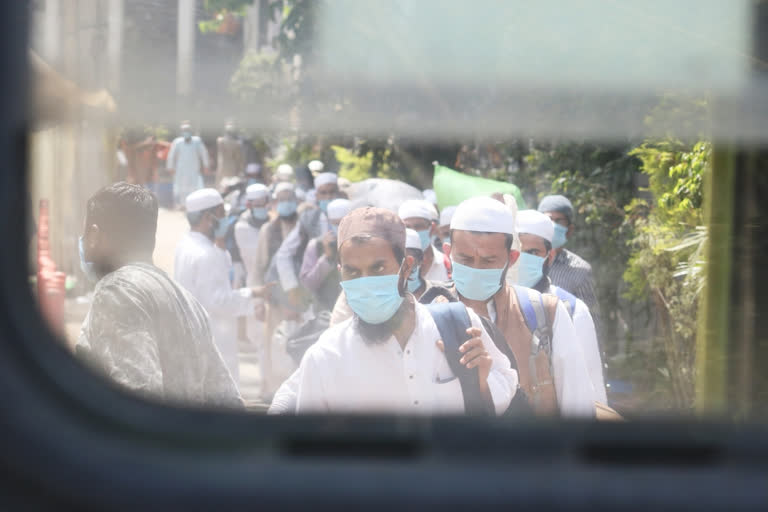Hyderabad: The COVID-19 pandemic has had a very negative and potentially dangerous manifestation that erupted in early April and left unchecked, this media related trend can impact India's societal harmony and the related internal security dimension.
The congregation of the Tablighi Jamaat, a conservative Muslim religious group (established in 1927) in Nizamuddin in mid-March with a large number of foreign participants and its subsequent linkage with the spread of the coronavirus caused an enormous scare in India. In the period end-March to early April many parts of India reported corona infection cases that were traced to participants in the Nizamuddin Tablighi Jamaat (TJ) and this was reported widely by the audio-visual medium.
Regrettably, the kind of sectarian and communal anti-Muslim bias that was noted during the nation wide protests of early 2020 related to the Citizenship Amendment Act (CAA) erupted in a very ugly manner in one section of the audio-visual media.
Some TV channels shaped their reports about the spread of the corona cases in a visibly biased manner and introduced a communal dimension to the virus. In early April phrases like Tablighi-virus and Corona-jihad were widely used on social media and the most outlandish reportage went to the extent of suggesting that this virus originated in Nizamuddin – and not Wuhan!
A few major TV channels and news agencies went into overdrive and engaged in peddling fake news to further the perception that members of the TJ who were taken to hospital for observation had misbehaved with the medical staff and had defecated in public spaces. One channel carried out a sting operation that sought to establish the TJ as having deliberately violated COVID-19 protocols during the lockdown announced on March 24.
Read: COVID-19 challenge and Tablighi Jamaat: Need for objective focus
Such vile reports were later found to be baseless and various fact-checking groups on social media revealed the degree of fake news that had been deliberately disseminated to paint the minority Muslim community in bad light. The extrapolation from castigating the TJ congregation in Nizamuddin for flouting public health restrictions to demonizing the entire Indian Muslim community was done in a sly and insidious manner by this section of the media and the pattern is familiar.
While the leadership of the TJ must be held responsible for the manner in which the mid-March congregation was held despite the widely reported news about COVID-19 - the selective media bias cannot be ignored. Large gatherings of individuals were to be avoided and PM Modi had announced the lakshman rekha in his March 24 address.
Thus, the fact that hundreds of Tablighi participants were staying in confined spaces for an extended period was in violation of the public health regulations that had been announced and the media had a legitimate right to report transgressions where they occurred.
Questions have also been raised as to why the local police had allowed such a congregation to take place and only an objective investigation can provide the right answers. Due process of law has been invoked and the TJ leader Maulana Saad has since been charged with culpable homicide under Section 304 of the Indian Penal Code (IPC).
However, a cursory survey of major events in India during the fortnight when the TJ held its meeting in Nizamuddin and the subsequent corona scare indicates that other large gatherings – whether political in nature or associated with Hindu religious venues or festivals, did not receive this kind of media scrutiny and critical comment from the Tablighi-virus constituency.
Read: COVID-19 quarantine facilities: Need of the hour
These include the change of government in Bhopal, Ram Navami celebrations in Lucknow and the traditional gathering of devotes in Tirupati, Thiruvanathapuram and most recently in the Chittapur taluk of Karnataka and its venerated Siddalingeshwara jatra.
Public health is a national challenge and currently COVID-19 has become a global issue with the virus exuding a truly democratic characteristic, albeit diabolical – in that it spreads equally – irrespective of nationality, religion, ethnicity and the rich-poor divide. Thus it is illogical to adopt a position that seeks to suggest, however elliptically, that the Muslim Tablighi congregation is more of a public health hazard than the Christian Easter Sunday or its Hindu variant.
Regrettably, in recent years, one section of the media in India has nurtured a hate-filled discourse that has distorted the true meaning of what constitutes patriotism and the national interest as derived from the principles enshrined in the Constitution.
Intolerance of the 'other' and the angry intimidation of dissent through feigned nationalism that advances a corrosive Hindutva agenda is the more dangerous virus that threatens India. This ideology is very different from the essence of Hinduism as practiced by millions of Indians who do not wear religion on their sleeve and is the dominant refrain in that cross-section of the media that demonizes its detractors and critics.
The Tablighi Jamaat has a wide foot-print in the sub-continent and the larger Islamic world. It espouses an ideology that seeks to take the true believer back to the original tenets of the Islamic faith and many moderate Muslims have also referred to it as a 'taklifi' jamaat – one that creates problems.
Resorting to an easy and glib binary that equates the Muslim community with terrorism and corona is a hate-filled path that can lead India into dangerous terrain. A manipulative media can take diverse communities to a murderous denouement and the tragic experience of Rwanda is case in point. This is the critical 'lakshman rekha' that India must not cross.
(The author, C Uday Bhaskar is the director of Society for Policy Studies.)


